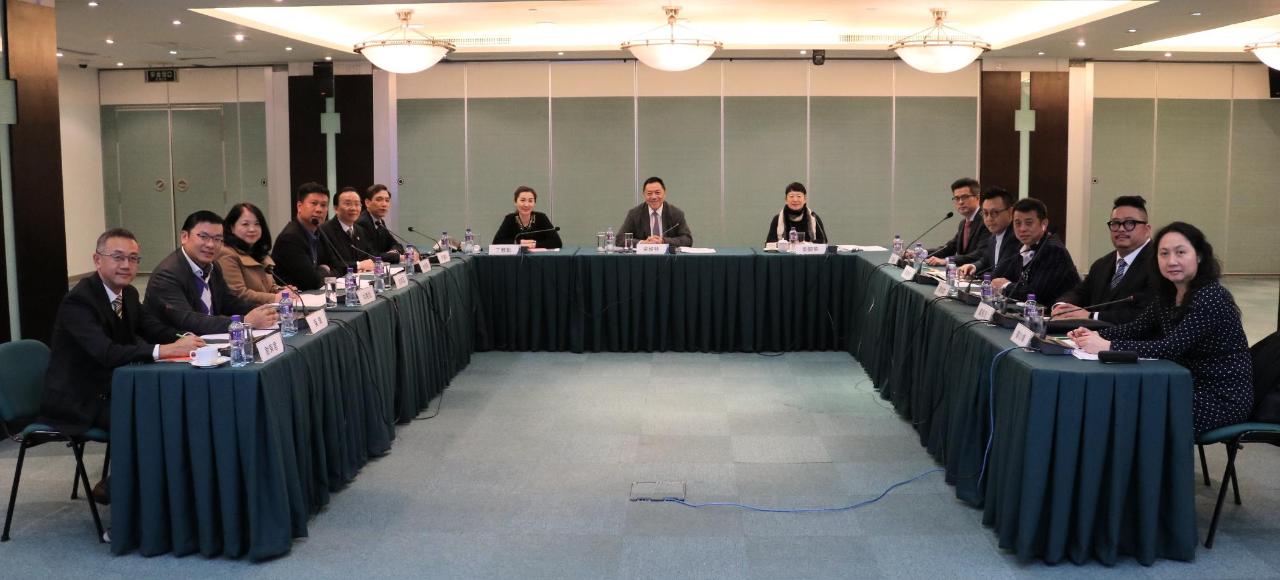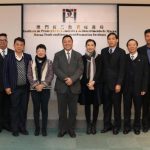 Committee for the Development of Conventions and Exhibitions holds the first plenary ordinary meeting of 2019
Committee for the Development of Conventions and Exhibitions holds the first plenary ordinary meeting of 2019
The Committee for the Development of Conventions and Exhibitions held its first plenary ordinary meeting for this year on 16th January in the Multi-function Conference Hall on the 19th Floor of China Civil Plaza. The meeting included the briefing on the current policy supports for the convention and exhibition sector (or MICE industry) and relevant measures, the discussion on the analysis report of Macao’s current MICE talent pool and support measures for MICE development in neighboring regions, as well as the consultation with the Committee about measures responding to the development of Macao’s MICE sector, aiming to optimise and foster the development of Macao’s MICE industry.
The meeting was moderated by the Chairman of the Committee cum the Secretary for Economy and Finance of the Macao SAR Leong Vai Tak. According to him, the SAR Government’s strategy to further the MICE development by “prioritising conventions” has made visible achievements. In 2017, the increase value of Macao’s MICE industry amounted to MOP 3.548 billion, accounting for 0.9% of the general increase value of all industries, up by nearly 147% compared with the MOP 1.44 billion in
2015. Meanwhile, a total of 28 conventions sizing more than a thousand attendees were introduced in Macao via the “One-stop Service” for MICE Bidding and Support, reaching an annual growth of nearly 50%. Last year, more than 35,000 event exhibitors and attendees were directed to different local neighbourhoods for sightseeing and shopping, which effectively vitalised the local community economy.
MICE Sector to Improve Competitiveness
Secretary Leong Vai Tak pointed out that the opening of the Hong Kong-Zhuhai-Macao Bridge will be beneficial to Macao’s integration into the development of the Guangodng-Hong Kong-Macao Greater Bay Area and to the multilateral regional co-operation. He added that adjoining regions including Hong Kong, Zhuhai and all cities in the Greater Bay Area will also take the opportunity to pro-actively enhance their competitiveness at the same time, so MICE sector of Macao should map out an effective way to enhance the city’s competitiveness by taking into consideration the talent competition, diversion of customer base, software and hardware facilities, and the spillover effect of policies launched in neighbouring areas. He also identified some of the major tasks for the future development of Macao convention and exhibition industry, namely, making better use of the city’s advantages, deepening of collaboration via “+ Macao”, giving full play to the city’s characteristics – “high quality and devotion to details” and “precise liaison” – and be prepared for these tasks beforehand to carry out competitive collaboration with adjoining regions in a competitive environment, which will lead to common progression.
Regarding the MICE training, Secretary General of the Committee cum Acting President of IPIM Irene Va Kuan Lau said that IPIM supports the qualitative development of the local MICE sector by subsidising professional trainings and certified courses that are internationally regconised were held collaboratively by local MICE industry and international authoritative organisations, such as the Certified in Exhibition Management (CEM) Learning Programme and the UFI Exhibition Management Degree (UFI-EMD). As of the end of 2018, the city has trained 238 local CEM registered managers and 88 local EMD senior managers. In 2018, part of training quotas in the above-mentioned trainings were reserved for MICE practitioners from the Guangdong-Hong Kong-Macao Greater Bay Area and Portuguese-speaking countries, with a view to fostering common growth. IPIM has been recruiting local youths to work in all different MICE activities organised by IPIM to allow them to gain hands-on experience and cultivate their interest in MICE careers.
During the discussion on the MICE support measures newly launched by the neighbouring regions, Irene Va Kuan Lau pointed out that the new measures taken in adjoining areas like Hong Kong, Zhuhai, Guangzhou and Shenzhen will improve the competitiveness of their MICE sectors. She also consulted the Committee about Macao’s response to relevant measures, aiming at furthering the qualitative development of the city’s MICE industry.
The Committee members actively gave opinions concerning MICE talent cultivation and improvement of competitiveness of Macao’s MICE sector. The suggestions included adopting the practice of banks, which encourages students of local tertiary education institutions to actively join MICE activities by acknowledging their participation in MICE with “growth points”, facilitating the talent recruitment for local MICE sector. Other opinions included further optimising the existing support measures for the MICE training according to the latest development of the industry, enhancing the planning of hardware and software facilities for the transportation service of the Hong Kong-Zhuhai-Macao, improving the capability of Macao’s MICE sector in high-end market.



